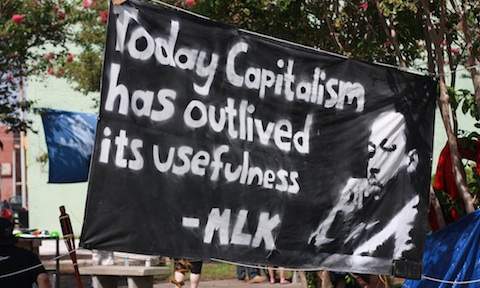
Years later, Anita Hill still has truth to speak and lessons to teach. (photo: Jemal Countess/Getty Images for Time)
By Dahlia Lithwick, Slate Magazine
23 March 14
 t’s fair to say that the target audience for the new documentary Anita, which opens Friday in theaters, is not Ginni Thomas.
t’s fair to say that the target audience for the new documentary Anita, which opens Friday in theaters, is not Ginni Thomas.
One of the ways we know this is that the movie, about
Anita Hill, opens with the audio of Mrs. Thomas’ bizarre 2010 voice mail
message, asking professor Hill to “consider an apology and some full
explanation of why you did what you did with my husband.
So give it some
thought. I certainly pray about this and hope one day you will help us
understand why you did what you did. OK! Have a good day!"
It’s pretty clear that Frieda Lee Mock, the director,
isn’t trying to win over the “little bit slutty and a little bit nutty”
crowd, which still maintains that Hill was a deranged fabulist and
attention seeker when she testified to Congress that Clarence Thomas,
then a Supreme Court nominee, sexually harassed her when he was her
boss. As far as Mock is concerned, Anita Hill was truthful back when she
was 35, and Anita Hill is truthful now at 57. The only story to tell is
how she has fared since the infamous 1991 confirmation hearings that
made her a household name. Through the voices of longtime friends,
corroborating witnesses, plus Jill Abramson and Jane Mayer, whose 1994
book, Strange Justice, bolstered Hill’s claims, what emerges in Anita is the closing argument the Senate never heard.
Hill has been on something of a media tear this month, promoting the film on The Daily Show, The View,
MSNBC, and in several online chats. Hill knows that her name is
familiar to those of us who were old enough to be paying attention back
in the early ’90s. And she knows she won’t be changing the minds of
Thomas partisans. Her target demographic is young people.
I spoke to her yesterday about why she was willing to
dredge up that awful fall of 1991, and step back into a spotlight that
had been anything but kind to her. In the intervening years, she has
received death threats, bomb threats, threats of sexual violence, and a
sustained campaign to have her fired from her first teaching job in
Oklahoma. All that plus a 7:30 a.m. call from Ginni Thomas. This has been her life. She hadn’t planned on any of it.
In the film Hill says that she once believed she could
devote just two years, post-confirmation hearings, to sexual harassment
law, and then return to her pet subjects: “Initially,” she tells me, “I
thought I would just go back and do what I do: commercial law and
contracts. But within months I was getting so many requests that it just
felt that there was a sincere effort for people to understand sexual
harassment.
It took a lot of letters from people who were asking really
sincere questions, and so I gave it two years. And 23 years later … I
say to people I do know how to count. There just seem to be so many layers to the problem that we’re still trying to address them.”
Almost every recent interview with Hill begins with an interlocutor observing, in great amazement, that 23 years
have elapsed since the hearing. I ask whether that’s because it feels
like it’s been longer, or because it feels so recent. She laughs: “Isn’t
that odd, though? I think that both are going on. I mean, you look at
that panel of men in the Senate and it’s 1991 and yet it looks like 50
or 60 years ago. And yet at the same time, when people look at the
footage and they see me, they think, “Was that all? Could it have been 23 years ago? Because all these issues are still with us.”
Are they still with us? Heck yes. “Look at the mayor of San Diego, or look at Jonathan Martin,” says Hill, referring to alleged serial harasser Bob Filner, now resigned, and the NFL player
who was tormented on the job. “These episodes just keep coming up over
and over again. We know that in 1991 we started to really understand and
to take it seriously. But I think in 2014 we have an opportunity to
take it seriously for the young women who are on campuses, and the young
women who are in the military. And for the women in workplaces that
have not gone addressed.”
We forget that sexual harassment law almost didn’t
exist 30 years ago. And yet in some ways we are still such a pack of
brutalizing harassers. How is it possible that all these years later,
after Sen. Howell Heflin of Alabama, a Democrat, first called
Hill a “scorned woman” and Sen. Alan Simpson of Wyoming, a Republican,
referred to all that “sexual harassment crap,” we still have Sandra
Fluke? Doesn’t that depress Anita Hill? It depresses me. Do we treat
women any better than we did 20 years ago, in the workplace or in public
discourse about the workplace?
Hill says there is a difference today: “What I am
hoping,” she says, “is that this movie will shed a light on the process
of 1991 and people can ask themselves, are our processes any better
today? Are our policies more responsive today? And I think they clearly
are better because I hear from a lot of women that after 1991 it wasn’t
just that women started to file complaints, but they went into their
employment arenas and said, ‘This has got to change, we’ve got to let
people know what their rights are, we have to stop the culture of our
workplaces that support and suborn these behaviors.’ … There is still
work to be done. It took a lot of very brave women for us to get here.
People say, ‘I thought we’d already fixed that problem.’ No. But we’ve acknowledged it.”
And that’s the most brutal part of the film: reliving
the complete and systemic failure to acknowledge what Hill was saying,
the failure to take her seriously, the failure to call her corroborating
witnesses. In the end, Joe Biden, then-chairman of the Judiciary
Committee, and the Democrats who failed her come out looking almost as
bad as the Republicans who call her names. One of the most crazy-making
aspects of the film is that we are forced to watch 14 white male United
States senators persistently refuse to make eye contact with Hill—their
eyes roll around the room like Cookie Monster’s—while they grill her for
almost nine hours on the lurid details of penis length, large breasts,
Long Dong Silver, and the pubic hair in the Coke can. Over and over,
each thinking he is the Perry Mason of Porn. Yet Hill answers,
repeatedly, politely, clarifying and explaining that she is not making a
formal sexual harassment claim; that she didn’t ask to come forward and
testify. She never loses it, even when the viewer desperately wants her to.
It’s not until we arrive at Clarence Thomas’ “high-tech lynching” speech
that the room stills. The proceeding is completely under Thomas’
control. The hearing is effectively over. “I had a gender and he had a
race,” says Hill at one point in the film. I ask her what that means.
“There were people who tried to ignore the fact that I was an
African-American woman, and very importantly, there were senators and
the people in the country who ignored the fact that in Washington, D.C.,
particularly in 1991, there was a great deal of entitlement that went
along with being a male. … They didn’t take that into account and
instead they portrayed him as an African-American who could use the
lynching metaphor to his advantage.”
I ask Hill how it felt to bite back her own anger
while Thomas gave full vent to his. “I don’t use my anger as a
strategy,” she replies. “And I think that’s what he was doing. That was a
strategy. I don’t even know how real it was.” She adds: “Of course I
get angry. I have processed all of the emotions: hurt, anger, outrage,
bewilderment that this could be happening, denying that this could
happen. ... Maybe all those different phases of grief. And I do tend to
process it privately. That is the nature of who I am. Even if I am seen
as a public figure, I can’t put everything out there because people want
to see it.
“Being who we are is the only way to effectively
convey the truth of our experiences. And processes ought to allow for
that,” Hill says. She recalls how, in the movie, Arizona Sen. Dennis
DeConcini, a Democrat, says something to the effect of “ ‘well, when
women are harassed, they oughta do this and they oughta do that and they
oughta get angry and they oughta raise hell.’ But people can’t tell us
how we respond to our own problems. They shouldn’t say ‘because she
didn’t act the way I would have acted, it must not be true.’ ” She
laughs: “You’re supposed to bang on the table! But had I done what
DeConcini said, then I would have been caricatured in a different way.”
Hill doesn’t just want to teach young people a
(recent) history lesson. She wants them to see, too, how things have
turned out just fine for her. The second half of Anita shows
Hill in her new life, teaching law at Brandeis, in a long-term
relationship, love-bombed by family, and surrounded by young women
seeking to learn from her experience. The fact that so few young people
have heard of her is staggering. (The trailer opens with a teacher
asking a class full of young women if they have heard of Anita Hill.
They blink at her.) It’s especially galling in light of what she
represented.
The change in the numbers of women in government can be at
least partially attributed to the hearings. (In 1991 there were two
women in the Senate. In 1992, “the year of the woman,”
female politicians enraged by the hearings won four new Senate seats
and 24 new House seats.) Hill’s testimony had a huge impact on sexual
harassment law, and in the public discourse. Watching the movie Anita
made me very angry, but talking to the person Anita gave me some hope
that the next generation of women, many of whom don’t even know her
name, will be fully visible in the eyes of the law, in part because of
her ordeal.










 nd today, with the announcement that his lawyers
nd today, with the announcement that his lawyers 
 t’s fair to say that the target audience for the new documentary
t’s fair to say that the target audience for the new documentary 







